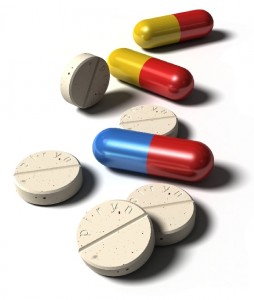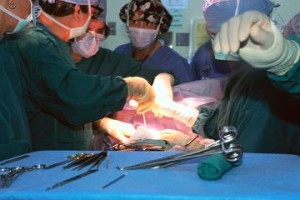 The treatment goals of GERD, are elimination of symptoms, healing of esophagitis, managing or preventing complications, and maintaining remission. The vast majority of patients can be treated successfully with the noninvasive methods of lifestyle modification and medication. Although lifestyle modification remains a cornerstone of initial therapy in GERD, it may not be sufficient to control symptoms, especially in those with complications However, weight loss, exercise, elevation of the head during bedtime, not eating within three hours of bedtime, no tobacco smoking, decreasing dietary fat and volume of meals and avoiding dietary irritants such as alcohol, peppermint, onion, citrus juice, coffee, and tomatoes are important measures to reduce symptoms. Potentially harmful medications such as NSAIDs, potassium tablets, bisphosphonates, beta blockers, Theophylline and calcium-channel blockers should be avoided or modified if possible that can aggravate the symptoms and effects of GERD. All medications should be taken with 6-8 ounces of water in an upright position.
The treatment goals of GERD, are elimination of symptoms, healing of esophagitis, managing or preventing complications, and maintaining remission. The vast majority of patients can be treated successfully with the noninvasive methods of lifestyle modification and medication. Although lifestyle modification remains a cornerstone of initial therapy in GERD, it may not be sufficient to control symptoms, especially in those with complications However, weight loss, exercise, elevation of the head during bedtime, not eating within three hours of bedtime, no tobacco smoking, decreasing dietary fat and volume of meals and avoiding dietary irritants such as alcohol, peppermint, onion, citrus juice, coffee, and tomatoes are important measures to reduce symptoms. Potentially harmful medications such as NSAIDs, potassium tablets, bisphosphonates, beta blockers, Theophylline and calcium-channel blockers should be avoided or modified if possible that can aggravate the symptoms and effects of GERD. All medications should be taken with 6-8 ounces of water in an upright position.
In the majority of patients, medications are necessary to control symptoms. Over-the-counter antacids, histamine2 (H2) blockers and PPI agents on an as-needed basis may be helpful for those individuals who have mild symptoms. However, for many men, and certainly for those with complications, one must use prescription agents for more effective therapy.
Proton pump inhibitors (PPIs), such as esomeprazole, lansoprazole, omeprazole, pantoprazole, rabeprazole and dexlansoprazole are the most effective medical therapeutic agents for the treatment of GERD. Proton pump inhibitors provide excellent acid suppression and effective symptom relief. In patients who are unable to swallow pills, capsules may be opened and the granules mixed in water or juice; or sprinkled on applesauce or yogurt.
Maintenance therapy is most often required, because relapses are common in patients with GERD, especially those with associated complications. Long-term treatment with adequate doses of medication is the key to effective treatment. For the majority of patients with esophageal strictures, the use of acid suppression and esophageal dilatation are effective therapy. Aggressive acid suppression is effective in the majority of patients with GERD-related atypical chest pain and ENT and pulmonary complications. Maintenance therapy is required in all of these patients because relapses occur very soon after cessation of therapy. In patients with Barrett’s esophagus, chronic medical therapy is warranted, although its success remains controversial.
 Although the vast majority of patients with GERD can be successfully managed with medical therapy, invasive methods of surgery and endoscopic treatment of GERD may be warranted in some patients. Surgery is an option for some patients with GERD and is able to be performed laparoscopically. It is indicated in patients with intractable GERD, difficult-to-manage strictures, severe bleeding, nonhealing ulcers, recurrent aspiration, and GERD requiring large maintenance doses of PPI agents or H2 receptor antagonists. Although Barrett’s esophagus alone is not an indication for surgery, surgery is warranted for Barrett’s esophagus with what is termed high-grade dysplasia and certainly for esophageal cancer.
Although the vast majority of patients with GERD can be successfully managed with medical therapy, invasive methods of surgery and endoscopic treatment of GERD may be warranted in some patients. Surgery is an option for some patients with GERD and is able to be performed laparoscopically. It is indicated in patients with intractable GERD, difficult-to-manage strictures, severe bleeding, nonhealing ulcers, recurrent aspiration, and GERD requiring large maintenance doses of PPI agents or H2 receptor antagonists. Although Barrett’s esophagus alone is not an indication for surgery, surgery is warranted for Barrett’s esophagus with what is termed high-grade dysplasia and certainly for esophageal cancer.
Endoscopic therapy of GERD has been attempted. Implant of a biocompatible non-biodegradable polymer, radiofrequency energy application and endoscopic suturing below the gastroesophageal junction have been tried with limited success. Pyloric injections of botulinum toxin and implantable gastric electrodes in patients with refractory GERD and gastroparesis, a motility disorder of the stomach, have had limited success. Endoscopic techniques for treatment of Barrett’s esophagus are also evolving. Further evaluation of these therapeutic techniques is warranted.
In conclusion, GERD is the most common upper gastrointestinal disorder seen in men. Although most men have mild disease, complications that may be potentially life-threatening can occur. With appropriate evaluation and management GERD and its complications can be treated successfully in the majority of men.




Comments are closed.